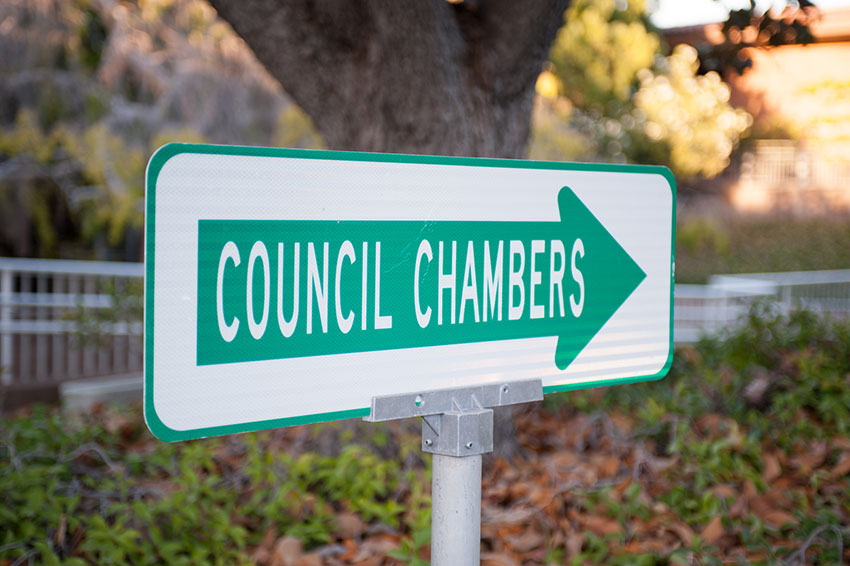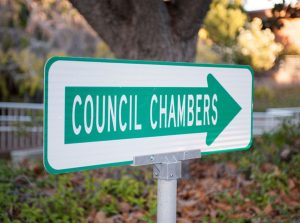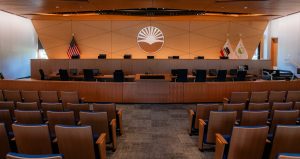Santa Clara will impose regulations on electric bikes and scooters to balance allowing the new transportation phenomena to thrive but reducing the problems caused by its disruptive nature.
Issues with parking, licensing, enforcement and liability all came up during the City Council’s Tuesday night meeting. In January, the City placed a moratorium on electric bike and scooter share programs through December until it could iron out the details of regulating them.
Mike Liw, Assistant Director of Public Works, said his department will do its “best to recovery as much City costs” as possible as it models the regulations after other cities.
Parameters such as a minimum and maximum amount of scooters allowed — 60 and 2,000 respectively — data availability, GPS tracking and customer service response will need to be established, he said.
Liw said the regulations are “not trying to replace state law,” which already limit the speed of scooters, who has to wear a helmet depending if they are under 18 years old and where scooterists can ride. Santa Clara’s regulations will simply aim to “be more specific about what we are looking for.”
The goal, he said, is not to “penalize operators,” which he said he hopes will work collaboratively with the City.
Martin Fatooh, a representative for electric-scooter operator Bird, said his company is a “willing participant” in the regulation but suggested that the proposed $20,000 annual application fee that some have “thrown around” is too high, especially when coupled with a per-scooter fee.
He instead suggested a performance bond so as to not increase costs for riders as to be prohibitive.
Suds Jain suggested limiting the scooters’ speed until riders have logged enough time on a scooter to ensure they do not hurt themselves or others.
Final regulations for scooters will likely see completion later this month with an ordinance in effect by October. Operators would then be set to rollout in early 2020.
Parade of Champions Set to Return
The group that wants to return the Parade of Champions to Santa Clara still has work ahead; however, the group was victorious on Tuesday when the Council agreed to sponsor the event by contributing $70,000 of public money.
Earlier this year, the Council tentatively agreed to pony up the money should the group be able to raise $80,000 by the end of June. With nearly $78,000 raised, City Manager Deanna Santana said she was “confident” the group would meet its goal by month’s end.
Ana Vargas-Smith, the group’s organizer, said the money raised is a “sign that the community really wants it,” calling it “serendipitous” that the group has been able to raise the money in such a short time. She has heard no objections to the parade’s return, she added.
“There [are] people literally jumping up and down,” she said.
Vice Mayor Patricia Mahan said the group’s enthusiasm is “overwhelming.”
While the route is still being planned, the parade is set for Saturday, Sept. 28.
Redistricting Ballot Initiative Moved Forward
The plaintiffs in a California Voting Rights Act (CVRA) lawsuit against the City have forced it to move up an initiative that aims to establish Santa Clarans’ preferences on how to elect its City Council.
The initiative, Measure N, would allow Santa Clarans to vote on whether or not to maintain the current six-district solution imposed by Santa Clara County Superior Court Judge Thomas Kuhnle.
The Council has already opted to establish a 7-member Charter Review Committee to craft the initiative — one from each district and one at-large — that will be vetted in the same way as other board and commission appointments.
While the work plan remains the same, City Clerk Hosam Haggag said the plaintiffs in the CVRA lawsuit have “taken action in regards to the appeal,” which has “accelerated the timeline.”
Instead of appearing on the November 2020 ballot, the question of districts will appear on the March 2020 ballot, he said.
Applications for the Charter Review Committee are due by June 28. The Council will hold interviews July 10.
Budget Gets a Few Changes Before Fiscal Year’s End
The City’s Finance Director also told the Council that the City is continuing to “eliminate deficits” during a presentation of the two-year budget.
Angie Kraetsch, Director of Finance, said the 10-year forecast “keeps looking better and better.”
The City, which now operates on a little less than $1 billion a year, was in financial dire straits not too long ago and forecast to operate at a deficit that would continue to grow over the next decade.
However, Kraetsch said budgets for 2019/20 and 2020/21 are both balanced and the budget stabilization reserve is at an “unprecedented” high.
As the City nears the end of its fiscal year and approves the budget, a few minor amendments came into focus.
Spectra requested a $350,000 amendment for the Convention Center for a full-time sales person and some aesthetic and operational maintenance. The amendment drops the net revenue for the Convention Center from $2.3 million to $1.9 million.
Council Member Raj Chahal said Sunnyvale and Palo Alto both have salary and benefits that are roughly 20 percent lower than Santa Clara’s. He said he would like the finance department to look into how the City can achieve similar numbers, saving money in the process.
The Council’s next regular meeting is Tuesday, June 25 in the Council Chambers at City Hall, 1500 Warburton Ave. in Santa Clara. Council Member Debi Davis was absent.












0 comments